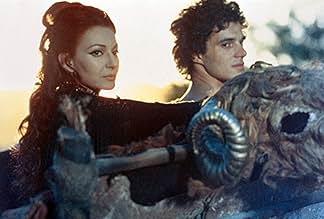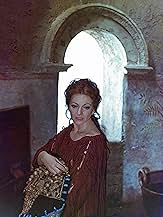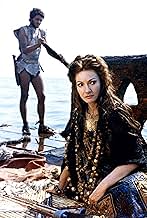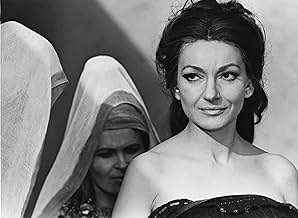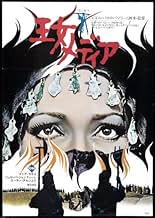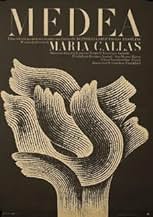IMDb-BEWERTUNG
6,9/10
5862
IHRE BEWERTUNG
Auf der Suche nach dem Goldenen Vlies kehrt Jason mit der mächtigen Zauberin Medea nach Griechenland zurück. Aber als der König sie verbannt, schmiedet Medea finstere Rachepläne.Auf der Suche nach dem Goldenen Vlies kehrt Jason mit der mächtigen Zauberin Medea nach Griechenland zurück. Aber als der König sie verbannt, schmiedet Medea finstere Rachepläne.Auf der Suche nach dem Goldenen Vlies kehrt Jason mit der mächtigen Zauberin Medea nach Griechenland zurück. Aber als der König sie verbannt, schmiedet Medea finstere Rachepläne.
- Regie
- Drehbuch
- Hauptbesetzung
- Auszeichnungen
- 2 Nominierungen insgesamt
Margareth Clémenti
- Glauce
- (as Margareth Clementi)
Annamaria Chio
- Wet-nurse
- (as Anna Maria Chio)
Empfohlene Bewertungen
I first saw Medea in college and was highly critical of it, finding it disappointing on almost all counts: terrible sound editing, cheap film stock, over bright lighting, bizarre, amateurish acting styles, inadequately edited, etc. Then there was the extended murder scene of Glauce and Creon going seemingly on forever, and then . . . wait; what's this? It's repeated all over again? Did someone get the wrong reel into the house?
Another ten years went by before I watched it again and after the second viewing, found myself emotionally drained, my jaw on the floor with the realization that I'd just finished a film that alternately horrified, fascinated and astonished me.
Medea is a grim, violent, film, minimally processed which only adds to its gruesome, wild rawness. This is Pasolini's Medea, not Euripedes and it is not easy viewing. Its wild, African/Middle Eastern score with the nasal bleating of women's voices in near pre-historic sounding rhythmic chant adds further to the element of being "out there" this film produces: This is about as far away from popular cinema as one can get. Medea doesn't easily compare to films of any other style or genre; not even with some of Pasolini's other work. But, if you can succumb to its hypnotic, mesmerizing pace at once both frenetic and static - you will realize this is as about as close to a hallucinatory experience one can achieve without the use of an illegal substance. Granted, not everyone wants that experience.
As Medea, Callas is simply amazing. Oddly, when the film came out she was roundly criticized for not being able to transfer the magic she so naturally gave on stage to the big screen. I will strongly disagree. The more I watch this film (which is probably several times a year for well over a decade), the more amazed I am by her performance in it. Where I, too, had first been critical of her languid weirdness, I've grown to see her commitment to the role. I've come to be riveted to her painfully expressive mask as she completely inhabits this character who is, quite literally, capable of everything (yes - everything is the right word here).
Where I was once critical of the lighting, I've grown up to realize what Pasolini did; why he chose to film at the times of day he chose, and the resulting, fascinatingly brutal and surreal luminosity that bathes the entire film and the almost palpable sense of its visual texture. Stunning. The landscapes Pasolini chose to film in are as brutal and as vital as the characters of the tale. His near excision of all spoken text ( the screenplay is nearly dialogue free) brings us into a timeless, yet somehow ancient world where all is understood without the use of verbal communication. The savage, bloody rites of sacrifices for fertility and harvest initially seem barbarous then become somehow beautiful and fascinating. Then they make one cringe with the realization of how, not so long ago, this was us.
A remarkable, savage and beautiful film.
Another ten years went by before I watched it again and after the second viewing, found myself emotionally drained, my jaw on the floor with the realization that I'd just finished a film that alternately horrified, fascinated and astonished me.
Medea is a grim, violent, film, minimally processed which only adds to its gruesome, wild rawness. This is Pasolini's Medea, not Euripedes and it is not easy viewing. Its wild, African/Middle Eastern score with the nasal bleating of women's voices in near pre-historic sounding rhythmic chant adds further to the element of being "out there" this film produces: This is about as far away from popular cinema as one can get. Medea doesn't easily compare to films of any other style or genre; not even with some of Pasolini's other work. But, if you can succumb to its hypnotic, mesmerizing pace at once both frenetic and static - you will realize this is as about as close to a hallucinatory experience one can achieve without the use of an illegal substance. Granted, not everyone wants that experience.
As Medea, Callas is simply amazing. Oddly, when the film came out she was roundly criticized for not being able to transfer the magic she so naturally gave on stage to the big screen. I will strongly disagree. The more I watch this film (which is probably several times a year for well over a decade), the more amazed I am by her performance in it. Where I, too, had first been critical of her languid weirdness, I've grown to see her commitment to the role. I've come to be riveted to her painfully expressive mask as she completely inhabits this character who is, quite literally, capable of everything (yes - everything is the right word here).
Where I was once critical of the lighting, I've grown up to realize what Pasolini did; why he chose to film at the times of day he chose, and the resulting, fascinatingly brutal and surreal luminosity that bathes the entire film and the almost palpable sense of its visual texture. Stunning. The landscapes Pasolini chose to film in are as brutal and as vital as the characters of the tale. His near excision of all spoken text ( the screenplay is nearly dialogue free) brings us into a timeless, yet somehow ancient world where all is understood without the use of verbal communication. The savage, bloody rites of sacrifices for fertility and harvest initially seem barbarous then become somehow beautiful and fascinating. Then they make one cringe with the realization of how, not so long ago, this was us.
A remarkable, savage and beautiful film.
"Hell hath no fury like a woman scorned" describes Medea, whose hubris and amour fou for the bold and beautiful Jason leads to her downfall. Revered as a goddess by her own people, she betrays her own divinity and her race when she aids him to steal the sacred fleece, killing her own god-brother by decapitation during their escape. After bearing two sons to Jason in Greece, Medea is still not accepted and fails to adjust to Greek culture. The affection of acclaimed hero Jason strays and his ambition culminates in a betrothal to King Kreon's daughter. But when Medea learns of this betrayal and negation of her love and sacrifice her fury knows no bounds. She summons up the dark forces within her (she is a barbarian sorceress after all) for vengeance against those who have wronged her by killing Jason's sons, welcoming him with a false semblance of conciliation and acceptance while serving his dead sons to him for dinner. She sends two magnificent marriage cloaks to the king and his daughter who, when they don them, burst into flames. She then departs in rage leaving Jason to live with the results of the infamy he caused her enact through destroying her life. Maria Callas, in her only film, shows the famous range and subtlety she enjoyed as an opera star. Her fierce control and rage are memorable. Although this was a low budget film, it is extremely evocative and leaves lasting impressions. The sequence in the beginning when Jason was being tutored by the centaur Chiron about his destiny was very effective, and marked the innovative trick-photographic technique of melding man to horse to make it look very real and convincing. The primitive settings and human sacrifice of Medea's people helped to establish her dark, powerful and exotic barbarian character. English subtitles helped make up for the unfortunate dubbing. A strange and powerful version which holds it own against other interpretations.
Pasolini began his revisiting of the old myths with "gospel according to St Matthews" ,perhaps the best rendition of Christ's life on the screen,then tackled the Greek legends ,first "Edipe Re" then "Medea".
"Edipe Re" was framed by a prologue and an epilogue which took place in this day and age."Medea" displays two worlds colliding:Jason's one,a rational world where science begins to surface,and Medea's one,which is that of superstition,magic, a world that is to disappear.The legendary Golden Fleece is nothing but an old rag.And Pasolini does not show the ending of the legend when Medea flies away on her chariot;it's neither a Hollywoodian film ,nor one of those peplums Italian directors used to make by the dozen ten years before.The centaur -played by earnest thespian Laurent Terzieff- ,the only concession to some kind of show,looks like an ordinary character.Some users pointed out the primitive side of the background.But let's not forget that there are two degrees:Medea's world is primitive to the core;Jason's one is attaining what we call civilization.
"Edipe Re" was framed by a prologue and an epilogue which took place in this day and age."Medea" displays two worlds colliding:Jason's one,a rational world where science begins to surface,and Medea's one,which is that of superstition,magic, a world that is to disappear.The legendary Golden Fleece is nothing but an old rag.And Pasolini does not show the ending of the legend when Medea flies away on her chariot;it's neither a Hollywoodian film ,nor one of those peplums Italian directors used to make by the dozen ten years before.The centaur -played by earnest thespian Laurent Terzieff- ,the only concession to some kind of show,looks like an ordinary character.Some users pointed out the primitive side of the background.But let's not forget that there are two degrees:Medea's world is primitive to the core;Jason's one is attaining what we call civilization.
There are several directors that make "arty" films that are certainly not for everyone. Pasolini has also done films which can be more easily acceptable by wider audiences; yet this is not one of them. This is one of those films that can and will be liked by only a few people. Others will turn their head the other way or simply hate it...
Well I like weird art & films, I like Pasolini, and I liked Medea in various interesting aspects. I suppose one should at least know the basics of Euripedes story to comprehend the story - Pasolini doesn't focus in the story so much, important facts are assumed by the viewer and the dialogues are scarce within the film. No narration exists.
I think Pasolini here was more interested in presenting the cultural / ethnological / theological / religious stigma of the era - his usual interest on god and religion is also here, despite text is given few opportunities to breed context in this film. We have also the theme of ancient world VS the new world of logic and the new gods. This is one of the films, like, say, Hertzog's films, that are up to the viewer to comprehend, or a film critics would call a symbolic one. Needless to say one has to like to think while watching this one, not be spoon-fed.
Last but not least, the soundtrack enhances this strongly visual experience a lot. A set of strange but intense folk/ethnic/avant guard/experimental songs make the viewing a unique experience for those who like 'hard' films....
Well I like weird art & films, I like Pasolini, and I liked Medea in various interesting aspects. I suppose one should at least know the basics of Euripedes story to comprehend the story - Pasolini doesn't focus in the story so much, important facts are assumed by the viewer and the dialogues are scarce within the film. No narration exists.
I think Pasolini here was more interested in presenting the cultural / ethnological / theological / religious stigma of the era - his usual interest on god and religion is also here, despite text is given few opportunities to breed context in this film. We have also the theme of ancient world VS the new world of logic and the new gods. This is one of the films, like, say, Hertzog's films, that are up to the viewer to comprehend, or a film critics would call a symbolic one. Needless to say one has to like to think while watching this one, not be spoon-fed.
Last but not least, the soundtrack enhances this strongly visual experience a lot. A set of strange but intense folk/ethnic/avant guard/experimental songs make the viewing a unique experience for those who like 'hard' films....
I love Pasolini, and Medea is easily the weakest of his works that I've seen. After having made the brilliant adaptation of the Greek tragedy Oedipus Rex, Medea seems rather uninspired. It retains most of Pasolini's beautiful settings, but the script is a poor adaptation of Euripides' play. The film's as slow as they come, and to me it seemed like a way to cover up the lack of ideas. Maria Callas is excellent as Medea, but she really doesn't have that much screen time, if you measure it. Most of the film is made up of people performing weird rituals, and the characters of Jason and Medea don't do all that much. I don't like Pasolini's interpretation of Jason as a chauvanist, egotistical jerk. It's too simplistic, and it's unfair moralizing from a modern vantage point. The character has much more depth in the various myths, even in Euripides' play. Medea's depth is sapped, as well, and her motivation in the film is sketchy at best. And then there are a couple of confusing ellipses, especially an extended fantasy sequence (apparently) where Medea imagines killing Glauce and Creon, followed by the reality. It feels more like there were two versions of this section, and the editor screwed up and left both in. Pasolini's direction is often amazing, as is the cinematography and music. I didn't hate Medea, but I can't muster any enthusiasm for it. 6/10.
Wusstest du schon
- WissenswertesFinal part of Pier Paolo Pasolini's "Mythical Cycle" also including Edipo Re - Bett der Gewalt (1967), Teorema - Geometrie der Liebe (1968) and Der Schweinestall (1969).
- PatzerWhen Jason speaks to the two centaurs, there is a mismatch in their shadows in the middle of the screen, indicating that the image is a composite.
- Zitate
King Kresus: You are a barbarian from a foreign land, different from us. We don't want you among us. It is impossible to see into the depths of one's soul.
- VerbindungenEdited into Spisok korabley (2008)
Top-Auswahl
Melde dich zum Bewerten an und greife auf die Watchlist für personalisierte Empfehlungen zu.
- How long is Medea?Powered by Alexa
Details
Box Office
- Weltweiter Bruttoertrag
- 689 $
- Laufzeit1 Stunde 58 Minuten
- Sound-Mix
- Seitenverhältnis
- 1.85 : 1
Zu dieser Seite beitragen
Bearbeitung vorschlagen oder fehlenden Inhalt hinzufügen


